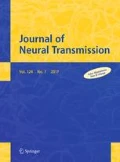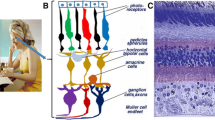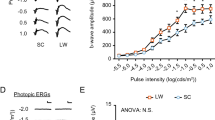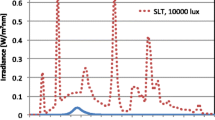Summary
The author describes how phototherapy may treat seasonal affective disorder (SAD) by stimulating the production of retinal dopamine and suppressing the production of retinal melatonin. This hypothesis offers a framework in which winter-induced retinal dopamine deficiency or retinal melatonin overactivity may cause SAD and by which light reverses this syndrome. This hypothesis is consistent with recent data indicating that phototherapy in SAD acts specifically through the eyes.
Similar content being viewed by others
References
Arbisi PA, Depue RA, Spoont MR, Leon A, Ainsworth B (1989) Thermoregulatory response to thermal challenge in seasonal affective disorder: a preliminary report. Psychiatry Res 28: 323–334
Besharse JC, Iuvone PM (1983) Circadian clock inXenopus eye controlling retinal serotonin n-acetyltransferase. Nature 305: 133–135
Besharse JC, Iuvone PM, Pierce ME (1988) Regulation of rhythmic photoreceptor metabolism: a role for post-receptoral neurons. In: Osborne N, Chader J (eds) Progress in retinal research. Pergamon Press, Oxford, pp 21–61
Blehar MC, Rosenthal NE (1989) Seasonal affective disorders and phototherapy. Arch Gen Psychiatry 46: 469–474
Bodis-Wollner I (1988) Altered spatio-temporal contrast vision in Parkinson's desease and mptp treated monkeys: the role of dopamine. In: Bodis-Wollner I, Piccolino M (eds) Dopaminergic mechanisms in vision. Alan R Liss, New York, pp 205–220
Bowmaker JK, Dartnall HJA, Mollon JD (1980) Microspectrophotometric demonstration of four classes of photoreceptor in an old world primate,Macaca fascicularis. J Physiol 298: 131–143
Brainard GC, Rosenthal NE, Sherry D, Kelly D, Skwerer RG, Schulz PM, Waxler M, Wehr TA (1990) Effects of different wavelengths in seasonal affective disorder. (Submitted)
Bunney WE, Janowsky DS, Goodwin FK, Davis JM, Brodie HKH, Murphy DL, Chase TN (1969) Effect of l-dopa on depression. Lancet i: 885–886
Cahill GM, Besharse JC (1989) A d-2 dopamine receptor agonist resets the phase of a circadian clock in cultured eyecups fromXenopus laevis. Soc Neurosci Abstr 15 (1): 24
Cahill GM, Besharse JC (1990) Circadian regulation of melatonin in the retina ofXenopus laevis: limitation by serotonin availability. J Neurochem 54: 716–719
Calzetti S, Franchi A, Taratufolo G, Groppi E (1990) Simultaneous vep and perg investigations in early Parkinson's disease. J Neurol Neurosurg Psychiatry 53: 114–117
Cruickshank JM, Neil-Dwyer G, Cameron MM, McAinsh J (1980) Beta-adrenoreceptor blocking agents and the blood-brain barrier. Clin Sci 59: 453S-455S
Depue RA, Iacono WG, Muir R, Arbisi P (1988) Effect of phototherapy on spontaneous eye-blink rate in seasonal affective disorder. Am J Psychiatry 145: 1457–1459
Depue RA, Arbisi P, Spoont MR, Krauss S, Leon A, Ainsworth B (1989 a) Seasonal and mood independence of low basal prolactin secretion in premenopausal women with seasonal affective disorder. Am J Psychiatry 146: 989–995
Depue RA, Arbisi P, Spoont MR, Leon A, Ainsworth B (1989 b) Dopamine functioning in the behavioral facilitation system and seasonal variation in behavior: normal population and clinical studies. In: Rosenthal NE, Blehar MC (eds) Seasonal affective disorders and phototherapy. Guilford Press, New York, pp 230–259
Depue RA, Arbisi P, Krauss S, Iacono WG, Leon A, Muir R, Allen J (1990) Seasonal independence of low prolactin concentration and high spontaneous eye blink rates in unipolar and bipolar II seasonal affective disorder. Arch Gen Psychiatry 47: 356–364
Dubocovich ML (1984) N-acetyltryptamine antagonizes the melatonin-induced inhibition of [3H]dopamine release from retina. Eur J Pharmacol 105: 193–194
Economou SG, Stefanis CN (1978) Changes of electrooculogram (eog) in Parkinson's disease. Acta Neurol Scand 58: 44–52
Ghilardi MF, Bodis-Wollner I, Onofrj MC, Marx MS, Glover AA (1988) Spatial frequency-dependent abnormalities of the pattern electroretinogram and visual evoked potentials in a parkinsonian monkey model. Brain 111: 131–149
Goodwin FK, Murphy DL, Brodie HKH, Bunney Jr WE (1971) Levodopa: alterations in behavior. Clin Pharmacol Ther 12: 383–396
Gunkel RD, Bornschein H (1957) Automatic intensity control in testing dark adaptation. AMA Arch Ophthalmol 57: 681–686
Hadjiconstantinou M, Rossetti Z, Silvia C, Krajnc D, Neff NH (1988) Aromatic 1-amino acid decarboxylase activity of the rat retina is modulated in vivo by environment light. J Neurochem 51: 1560–1564
HÄggendal J, Malmfors T (1965) Identification and cellular localization of the catecholamines in the retina and the choroid of the rabbit. Acta Physiol Scand 64: 58–66
Iuvone PM (1984) Regulation of retinal dopamine biosynthesis and tyrosine hydroxylase activity by light. Fed Proc 43: 2709–2713
Iuvone PM (1986) Neurotransmitters and neuromodulators in the retina: regulation, interactions, and cellular effect. In: Adler R, Farber D (eds) The retina: a model for cell biology studies, part II. Academic Press, Orlando, pp 1–72
Iuvone PM, Besharse JC (1986 a) Dopamine receptor mediated inhibition of serotonin nacetyltransferase activity in retina. Brain Res 369: 168–176
Iuvone PM, Besharse JC (1986 b) Involvement of calcium in the regulation of retinal serotonin n-acetyltransferase activity in the retina. J Neurochem 46: 82–88
Iuvone PM, Galli CL, Garrison-Gund CK, Neff NH (1978) Light stimulates tyrosine hydroxylase activity and dopamine synthesis in retinal amacrine neurons. Science 202: 901–902
Jacobsen FM, Murphy DL, Rosenthal NE (1989) The role of serotonin in seasonal affective disorder and the antidepressant response to phototherapy. In: Rosenthal NE, Blehar MC (eds) Seasonal affective disorders and phototherapy. Guilford Press, New York, pp 333–341
Jimerson DC (1987) Role of dopamine mechanisms in the affective disorders. In: Meltzer HY (ed) Psychopharmacology: the third generation of progress. Raven Press, New York, pp 505–511
Jimerson DC, Post RM (1984) Psychomotor stimulants and dopamine agonists in depression. In: Post RM, Ballenger JC (eds) Neurobiology of mood disorders. Williams & Wilkins, Baltimore, pp 619–628
Karson CN (1983) Spontaneous eye-blink rates and dopaminergic systems. Brain 106: 643–653
Klein DC (1978) The pineal gland: a model of neuroendocrine regulation. In: Reichlin S, Baldessarini RJ, Martin JB (eds) The pineal gland: a model of neuroendocrine regulation. Raven Press, New York, pp 303–327
Lewy AJ, Sack RL, Miller LS, Hoban TM, Singer CM, Samples JR, Krauss GL (1986) The use of plasma melatonin levels and light in the assessment and treatment of chronobiologic sleep and mood disorders. J Neural Transm [Suppl 21]: 311–322
Lewy AJ, Sack RL, Miller LS, Hoban TM (1987 a) Antidepressant and circadian phaseshifting effects of light. Science 235: 352–353
Lewy AJ, Sack RL, Singer CM, White DM (1987 b) The phase shift hypothesis for bright light's therapeutic mechanism of action: theoretical considerations and experimental evidence. Psychopharmacol Bull 23: 349–353
Lewy AJ, Wehr TA, Goodwin FK, Newsome DA, Markey SP (1980) Light suppresses melatonin secretion in humans. Science 210: 1267–1269
Lincoln GA (1983) Melatonin as a seasonal time-cue: a commercial story. Nature 302: 755
Moore RY (1978) The innervation of the mammalian pineal gland. In: Reiter RJ (ed) The pineal and reproduction. Karger, Basel, pp 1–29
Murphy DL, Goodwin FK, Brodie HKH, Bunney Jr WE (1973) L-dopa, dopamine, and hypomania. Am J Psychiatry 130: 79–82
O'Rourke D, Wurtman JJ, Wurtman RJ, Chebli R, Gleason R (1989) Treatment of seasonal depression with d-fenfluramine. J Clin Psychiatry 50: 343–347
Oren DA, Brainard GC, Johnston S, Joseph-Vanderpool JR, Sorek E, Rosenthal NE (1990 a) Phototherapy of seasonal affective disorder with green versus red light. (Submitted)
Oren DA, Joseph-Vanderpool JR, Rosenthal NE (1990 b) Adaptation to dim light in depressed patients with seasonal affective disorder. (Submitted)
Parver LM, Auker CR, Carpenter DO (1983) Choroidal blood flow, III: reflexive control in human eyes. Arch Ophthalmol 101: 1604–1606
Perry TL (1976) Hereditary mental depression with taurine deficiency: further studies, including a therapeutic trial of taurine administration. In: Huxtable R, Barbeau A (eds) Taurine. Raven Press, New York, pp 365–374
Pierelli F, Stanzione P, Peppe A, Stefano E, Rizzo PA, Bernardi G, Morocutti C (1988) Electrophysiological (perg, vep) abnormalities in Parkinson's disease are reversed by l-dopa. In: Bodis-Wollner I, Piccolino M (eds) Dopaminergic mechanisms in vision. Alan R Liss, New York, pp 253–265
Reppert SM (1990) Personal communication
Reppert SM, Sagar SM (1983) Characterization of the day-night variation of retinal melatonin content in the chick. Invest Ophthalmol Vis Sci 24: 294–300
Robins E, Robins JM, Croninger AB, Moses SG, Spencer J, Hudgens RW (1967) The low level of 5htp decarboxylase in human brain. Biochem Med 1: 240–251
Rosenthal NE, Heffernan MM (1986) Bulimia, carbohydrate craving, and depression: a central connection. In: Wurtman RJ, Wurtman JJ (eds) Nutrition and the brain. Raven Press, New York, pp 139–166
Rosenthal NE, Sack DA, Gillin JC, Lewy AJ, Goodwin FK, Davenport Y, Mueller PS, Newsome DA, Wehr TA (1984) Seasonal affective disorder: a description of the syndrome and preliminary findings with light therapy. Arch Gen Psychiatry 41: 72–80
Rosenthal NE, Sack DA, Carpenter CJ, Parry BL, Mendelson WB, Wehr TA (1985 a) Antidepressant effects of light in seasonal affective disorder. Am J Psychiatry 142: 163–170
Rosenthal NE, Sack DA, James SP, Parry BL, Mendelson WB, Tamarkin L, Wehr TA (1985 b) Seasonal affective disorder and phototherapy. Ann NY Acad Sci 453: 260–269
Rosenthal NE, Sack DA, Jacobsen FM, James SP, Parry BL, Arendt J, Tamarkin L, Wehr TA (1986) Melatonin in seasonal affective disorder and phototherapy. J Neural Transm [Suppl 21]: 257–267
Rosenthal NE, Jacobsen FM, Sack DA, Arendt J, James SP, Parry BL, Wehr TA (1988 a) Atenolol in seasonal affective disorder: a test of the melatonin hypothesis. Am J Psychiatry 145: 52–56
Rosenthal NE, Sack DA, Skwerer RG, Jacobsen FM, Wehr TA (1988 b) Phototherapy for seasonal affective disorder. J Biol Rhythm 3: 101–120
Sack RL, Lewy AJ, White DM, Singer CM, Fireman MJ, Vandiver R (1990) Morning vs evening light treatment for winter depression. Arch Gen Psychiatry 47: 343–351
Salceda R, López-Colomé AM, Pasantes-Morales H (1977) Light-stimulated release of [35 S] taurine from frog retinal rod outer segments. Brain Res 135: 82–88
Terman M, Terman JS, Quitkin FM, McGrath PJ, Stewart JW, Rafferty B (1989) Light therapy for seasonal affective disorder: a review of efficacy. Neuropsychopharmacology 2: 1–22
Thomas KB, Iuvone PM (1989) Tryptophan hydroxylase activity in chicken retina and pineal gland displays circadian rhythmicity. Soc Neurosci Abstr 15: 936
Wehr TA, Rosenthal NE (1989) Seasonality and affective illness. Am J Psychiatry 146: 829–839
Wehr TA, Jacobsen FM, Sack DA, Arendt J, Tamarkin L, Rosenthal NE (1986) Phototherapy of seasonal affective disorder: time of day and suppression of melatonin are not critical for antidepressant effects. Arch Gen Psychiatry 43: 870–875
Wehr TA, Skwerer RG, Jacobsen FM, Sack DA, Rosenthal NE (1987) Eye versus skin phototherapy of seasonal affective disorder. Am J Psychiatry 144: 753–757
Wheler GHT, Klein DC (1981) Function and regulation of taurine in the pineal gland. In: Schaffer SW, Baskin SI, Kocsis JJ (eds) The effects of taurine on excitable tissues. Spectrum Publications, New York, pp 107–121
Wiechmann AF, Bok D, Horwitz J (1985) Localization of hydroxyindole-o-methyltransferase in the mammalian pineal gland and retina. Invest Ophthalmol Vis Sci 26: 253–265
Wiechmann AF, Yang X-L, Wu SM, Hollyfield JG (1988) Melatonin enhances horizontal cell sensitivity in salamander retina. Brain Res 453: 377–380
Wirz-Justice A, Prada MD, Remé C (1984) Circadian rhythm in rat retinal dopamine. Neurosci Lett 45: 21–25
Witkovsky P, Stone S, Besharse JC (1988) Dopamine modifies the balance of rod and cone inputs to horizontal cells in the Xenopus retina. Brain Res 449: 332–336
Young SN (1986) The clinical psychopharmacology of tryptophan. In: Wurtman RJ, Wurtman JJ (eds) Nutrition and the brain. Raven Press, New York, pp 49–88
Author information
Authors and Affiliations
Rights and permissions
About this article
Cite this article
Oren, D.A. Retinal melatonin and dopamine in seasonal affective disorder. J. Neural Transmission 83, 85–95 (1991). https://doi.org/10.1007/BF01244455
Received:
Accepted:
Issue Date:
DOI: https://doi.org/10.1007/BF01244455




